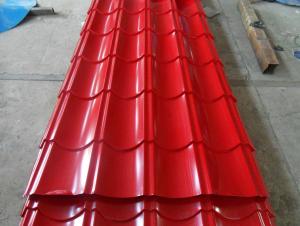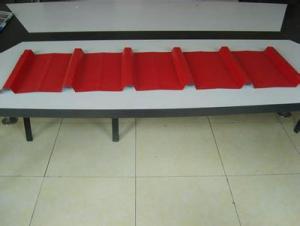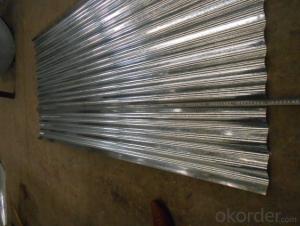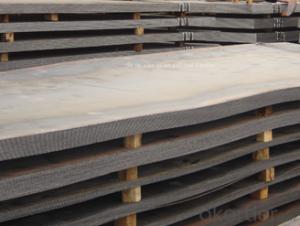Pre-Painted Galvanized Corrugated Steel---Red
- Loading Port:
- Shanghai
- Payment Terms:
- TT OR LC
- Min Order Qty:
- 100 m.t.
- Supply Capability:
- 10000 m.t./month
OKorder Service Pledge
OKorder Financial Service
You Might Also Like
1. Pre-Painted GI/GL Steel Coil Description:
With GI as base material, after pretreatment (degrease and chemical treatment ) and liquid dope with several layers of color, then after firing and cooling, finally the plate steel is called pre-painted galvanized (aluzinc) steel. Pre-painted galvanized steel is good capable of decoration, molding, corrosion resistance. It generally displays superior workability, durability and weather resistance.
2.Main Features of the Pre-Painted GI/GL Steel Coil:
• Excellent process capability
• Smooth and flat surface
• Workability, durability
• Excellent heat resistance performance
• High strength
• Good formability
• Good visual effect
3.Pre-Painted GI/GL Steel Coil Images
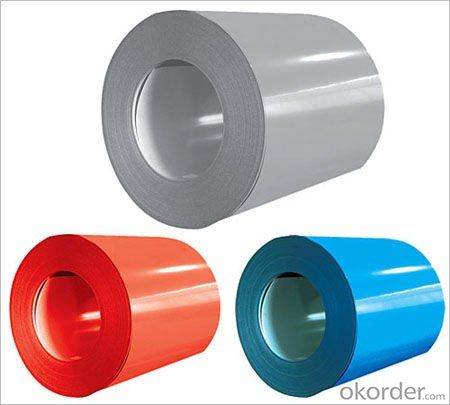
4.Pre-Painted GI/GL Steel Coil Specification
Standard: AISI, ASTM, BS, DIN, GB, JIS
Grade: DX51D, DX52D
Thickness: 0.17-2.0mm
Brand Name: KMRLON
Model Number: coil
Type: Steel Coil
Technique: Cold Rolled
Surface Treatment: Coated
Application: Boiler Plate
Special Use: High-strength Steel Plate
Width: 20-1250mm
Length: customized
commoidty: pre-painted galvanized steel coil
Thickness: 0.13-4.0mm
width: 20-1250mm
zinc coating: 40-180g/m2
printing thickness: top side: 20+/-5 microns, back side: 5-7 microns
color: all RAL color
surface treatment: color coated
coil weight: 4-7 tons
coil ID: 508/610mm
packaging: standard seaworthy packing
5.FAQ of Pre-Painted GI/GL Steel Coil
1. What’s the application of this product?
Roof, roof structure, surface sheet of balcony, frame of window, etc.
2. What’s the brand of the paint?
We use the best brand of all of the word—AKZO.
3. How to guarantee the quality of the products?
We have established the international advanced quality management system,every link from raw material to final product we have strict quality test;We resolutely put an end to unqualified products flowing into the market. At the same time, we will provide necessary follow-up service assurance.
4. How long can we receive the product after purchase?
Usually within thirty working days after receiving buyer’s advance payment or LC. We will arrange the factory manufacturing as soon as possible. The cargo readiness usually takes 15-25 days, but the shipment will depend on the vessel situation.
- Q:How do steel sheets perform in corrosion resistance?
- Steel sheets generally have good corrosion resistance due to the protective oxide layer that forms on the surface, which helps to prevent rusting and deterioration. However, the level of corrosion resistance can vary depending on the type of steel and the specific environmental conditions it is exposed to.
- Q:Must the welding between steel sheets be opened?
- Not necessarily, very thin plate, no opening, but also guarantee penetration, but also through nondestructive testing
- Q:How do steel sheets compare to wood sheets?
- Steel sheets and wood sheets have distinct differences in terms of strength, durability, and use cases. Firstly, steel sheets are known for their exceptional strength and durability. They can withstand heavy loads, extreme weather conditions, and are highly resistant to warping, rotting, and insect damage. Wood sheets, on the other hand, are less robust and can be vulnerable to moisture, termites, and decay if not properly treated or maintained. In terms of versatility, steel sheets offer a wide range of applications. They are commonly used in construction, automotive, and manufacturing industries due to their high tensile strength and structural stability. Wood sheets, on the other hand, are often used in interior design, furniture making, and smaller-scale construction projects due to their natural aesthetic appeal and ease of manipulation. Additionally, steel sheets are fire-resistant, making them a safer option compared to wood sheets, which are combustible and can contribute to the spread of fire. Steel sheets also have a longer lifespan, requiring less maintenance and replacement compared to wood sheets, which may need regular refinishing, sealing, or replacement due to wear and tear. However, wood sheets have their advantages as well. They are typically more cost-effective than steel sheets, making them a popular choice for budget-conscious projects. Wood sheets also have better insulation properties, providing natural warmth and soundproofing qualities. Ultimately, the choice between steel sheets and wood sheets depends on the specific requirements of the project, including factors such as budget, desired aesthetics, structural needs, and environmental considerations.
- Q:What is the cost of a standard steel sheet?
- The cost of a standard steel sheet can vary depending on factors such as size, thickness, and market conditions. It is advisable to check with suppliers or conduct market research to get accurate pricing information.
- Q:Can steel sheets be used for sculptures and artwork?
- Yes, steel sheets can definitely be used for sculptures and artwork. Steel is a versatile material that can be shaped, welded, and manipulated into various forms and designs. Its strength and durability make it ideal for creating large outdoor sculptures or intricate indoor artwork. Additionally, steel sheets can be painted, textured, or treated to achieve different visual effects, allowing artists to explore different creative possibilities.
- Q:What is the lifespan of a steel sheet?
- The lifespan of a steel sheet can vary depending on various factors such as the quality of the steel, the environment it is exposed to, and the level of maintenance and care it receives. However, on average, a well-maintained steel sheet can last anywhere between 20 to 30 years or even longer.
- Q:What are hot and cold plates?
- Production process: in the production process without heating, so there is no pitting and iron oxide defects often appear in the hot rolling, good surface quality, high degree of finish. Moreover, the cold-rolled products have high dimensional accuracy, and the performance and organization of the products can meet some special requirements, such as electromagnetic properties and deep drawing properties.
- Q:Are steel sheets suitable for high-traffic areas?
- Yes, steel sheets are highly suitable for high-traffic areas due to their durability, strength, and resistance to wear and tear. Steel sheets can withstand heavy foot traffic and are less likely to dent, scratch, or wear out compared to other materials. Additionally, they are easy to clean and maintain, making them an ideal choice for areas with high footfall such as corridors, staircases, and public spaces.
- Q:Are steel sheets resistant to bullet penetration?
- Yes, steel sheets are generally resistant to bullet penetration due to their high hardness and strength. However, the degree of resistance may vary depending on the thickness and quality of the steel.
- Q:Are steel sheets resistant to vibration or shaking?
- Yes, steel sheets are resistant to vibration or shaking due to their strong and rigid nature.
1. Manufacturer Overview |
|
|---|---|
| Location | |
| Year Established | |
| Annual Output Value | |
| Main Markets | |
| Company Certifications | |
2. Manufacturer Certificates |
|
|---|---|
| a) Certification Name | |
| Range | |
| Reference | |
| Validity Period | |
3. Manufacturer Capability |
|
|---|---|
| a)Trade Capacity | |
| Nearest Port | |
| Export Percentage | |
| No.of Employees in Trade Department | |
| Language Spoken: | |
| b)Factory Information | |
| Factory Size: | |
| No. of Production Lines | |
| Contract Manufacturing | |
| Product Price Range | |
Send your message to us
Pre-Painted Galvanized Corrugated Steel---Red
- Loading Port:
- Shanghai
- Payment Terms:
- TT OR LC
- Min Order Qty:
- 100 m.t.
- Supply Capability:
- 10000 m.t./month
OKorder Service Pledge
OKorder Financial Service
Similar products
New products
Hot products
Related keywords

